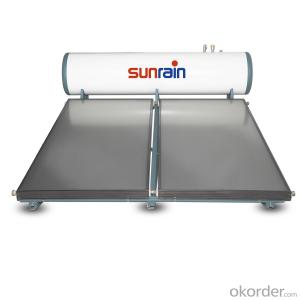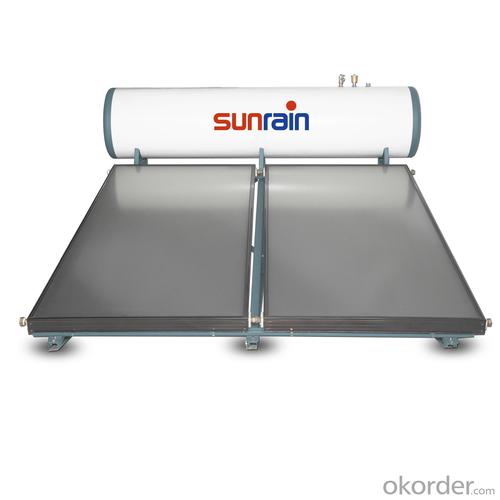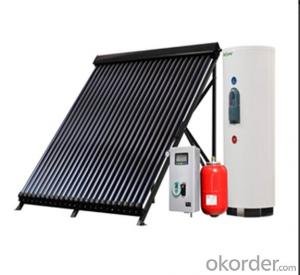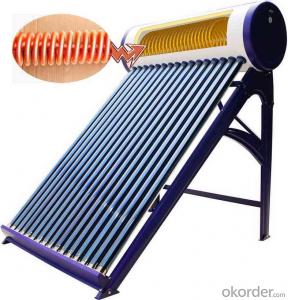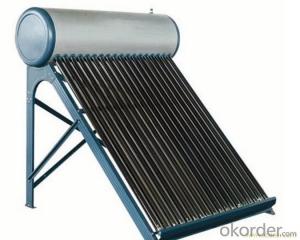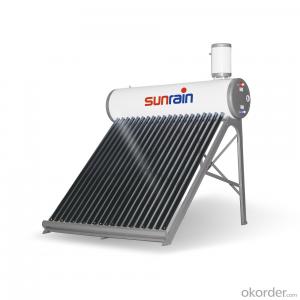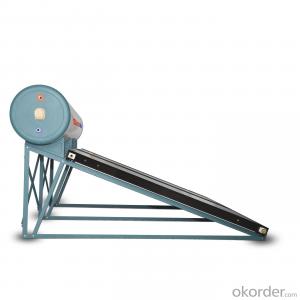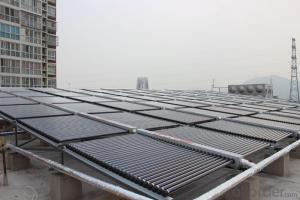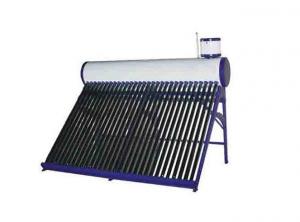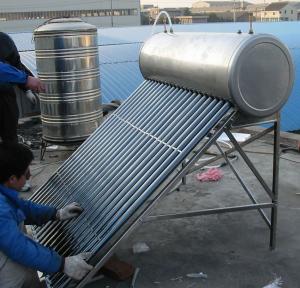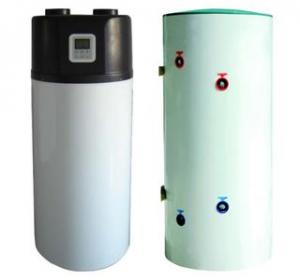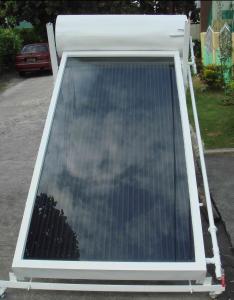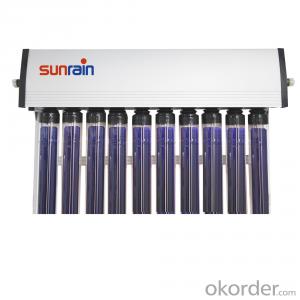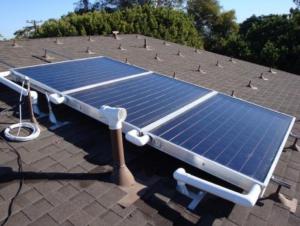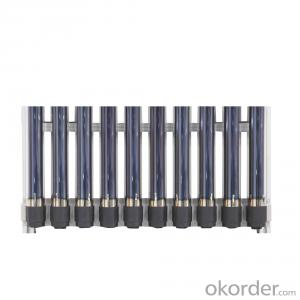Non-pressure flat plate solar water heater
- Loading Port:
- China Main Port
- Payment Terms:
- TT OR LC
- Min Order Qty:
- -
- Supply Capability:
- -
OKorder Service Pledge
Quality Product, Order Online Tracking, Timely Delivery
OKorder Financial Service
Credit Rating, Credit Services, Credit Purchasing
You Might Also Like
| Type | Flat plate |
| Pressure | Unpressurized |
| Circulation Type | Direct /Open Loop (Active) |
| Heating System | Thermosyphon (Passive) |
| Connection Type | pipe connection |
| Certification | CE |
| Model Number | FPS1150, 1200, 1300 |
| Recommend region | world wide |
- Q: How does the payback period of a solar water heater compare to a traditional water heating system?
- The payback period of a solar water heater is typically shorter compared to a traditional water heating system. This is because the initial cost of installing a solar water heater may be higher, but the savings on energy bills over time can offset the upfront investment. Additionally, solar water heaters are more energy-efficient and environmentally friendly, leading to long-term cost savings and reduced carbon footprint.
- Q: Can a solar water heater be used in areas with limited access to plumbing or infrastructure?
- Yes, a solar water heater can be used in areas with limited access to plumbing or infrastructure. Solar water heaters are designed to use sunlight to heat water, and they can be installed and operated independently of traditional plumbing systems. This makes them suitable for remote areas or places with minimal infrastructure, providing a sustainable and cost-effective solution for hot water needs.
- Q: How does the water hardness affect the performance of a solar water heater?
- Water hardness can have both positive and negative effects on the performance of a solar water heater. Hard water is characterized by high mineral content, specifically calcium and magnesium ions, which can lead to various issues in the system. One major impact of water hardness on a solar water heater is the formation of scale or mineral deposits. As hard water is heated, the minerals can precipitate and form a layer of scale on the heat exchanger or the inner walls of the tank. This reduces the efficiency of the heater by insulating the heat transfer surfaces, making it harder for the solar energy to be absorbed and transferred to the water. The build-up of scale can also restrict the flow of water, reducing the overall performance and potentially causing damage to the system. Furthermore, the accumulation of scale can lead to the corrosion of metal components within the solar water heater. The minerals in hard water can react with the metal surfaces, causing them to deteriorate over time. This corrosion can weaken the structural integrity of the system and may result in leaks or other malfunctions. On the other hand, the presence of minerals in hard water can also act as a heat conductor, enhancing the thermal performance of the solar water heater. The minerals in the water can help in absorbing and retaining heat, thus providing a slight boost to the heating efficiency of the system. To mitigate the negative effects of water hardness on the performance of a solar water heater, it is recommended to use a water softener or install a water treatment system that can remove or reduce the mineral content. Regular maintenance and cleaning of the system, including descaling, are also crucial to ensuring optimal performance.
- Q: Can a solar water heater be used in areas with limited access to electricity grid connections?
- Yes, a solar water heater can be used in areas with limited access to electricity grid connections. Solar water heaters use sunlight to heat water, eliminating the need for electricity. They are an excellent solution for areas without reliable or no access to the electricity grid, providing a renewable and sustainable source of hot water.
- Q: What is the impact of water usage patterns on the performance of a solar water heater?
- The impact of water usage patterns on the performance of a solar water heater can be significant. The efficiency and effectiveness of a solar water heater depend on the availability and quantity of sunlight to heat the water. If water usage patterns are such that hot water is predominantly used during times when there is limited sunlight, the performance of the solar water heater may be reduced. On the other hand, if water usage patterns align with peak sunlight hours, the solar water heater can operate at its maximum potential and provide ample hot water. Therefore, understanding and adjusting water usage patterns to match solar availability can greatly influence the performance and overall efficiency of a solar water heater.
- Q: What is the required maintenance cost for a solar water heater?
- The required maintenance cost for a solar water heater can vary depending on factors such as the type and size of the system, as well as the manufacturer's recommendations. Generally, the maintenance cost for a solar water heater is relatively low compared to other types of water heaters. It typically includes periodic inspections, cleaning of solar panels, checking and replacing any worn-out parts or components, and ensuring proper functioning of the system. However, specific maintenance costs can only be determined after considering the specific model and any additional warranty or service packages offered by the manufacturer.
- Q: Can a solar water heater be used in areas with limited access to grid electricity?
- Yes, a solar water heater can be used in areas with limited access to grid electricity. Solar water heaters rely on the heat from the sun to heat water, eliminating the need for grid electricity. This makes them a suitable and sustainable solution for areas without reliable access to electricity.
- Q: How much space is required for storing hot water in a solar water heater system?
- The space required for storing hot water in a solar water heater system can vary depending on the size of the system and the demand for hot water. Generally, a typical solar water heater system may require a storage tank with a capacity of 40-80 gallons (150-300 liters) to store the heated water.
- Q: What is the difference between passive and active solar water heaters?
- Passive solar water heaters rely on natural convection to circulate water, while active solar water heaters use pumps or fans to circulate water or heat transfer fluid.
- Q: Can a solar water heater be used in areas with high levels of humidity?
- Yes, a solar water heater can be used in areas with high levels of humidity. The performance of the solar water heater may be affected slightly by the humidity, but it can still effectively harness solar energy to heat water.
Send your message to us
Non-pressure flat plate solar water heater
- Loading Port:
- China Main Port
- Payment Terms:
- TT OR LC
- Min Order Qty:
- -
- Supply Capability:
- -
OKorder Service Pledge
Quality Product, Order Online Tracking, Timely Delivery
OKorder Financial Service
Credit Rating, Credit Services, Credit Purchasing
Similar products
Hot products
Hot Searches
Related keywords
